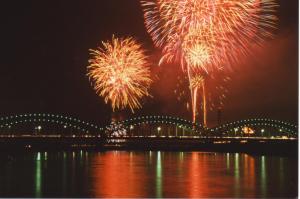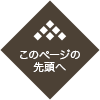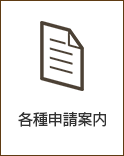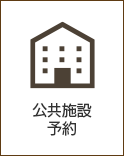Tourist Information
- Ashikaga Gakko
- Bannaji Temple
- Ashikaga Flower Park
- Kurita Museum
- City Museum of Art
- Orihime Shrine
- Soun Museum
Ashikaga Gakko

Ashikaga Gakko is known as the oldest university in Japan.
Ashikaga Citizen call it "Gakko-sama".
There are some theories that the Ashikaga School was founded by ...
- A remnant of the Kokugaku school in the Nara period.
- Lord Ono-no Takamura in the Heian period.
- Lord Ashikaga Yoshikane in the Kamakura period.
There are other claims that have been made ;However , existing records cannot support any theories prior to the year 1410.
When Lord Uesugi Norizane made various arrangements for the Ashikaga School. He donated the books which are designated as national heritages now, and he also established the school presidential system.
The Ashikaga School had in fact become the greatest academy in Japan , attracting some 3,000 students from all parts of the country in about 1550. And St.Francis Xavier noted in 1549 that the Ashikaga School was "the largest and most renowned university of eastern Japan."
Thus, did the reputation of the Ashikaga School spread abroad. In 1868, the system of presidents was changed to a system of head teachers, and school was opened up to the townspeople.
In 1872, the traditional Ashikaga School was, unfortunately, abolished. In 1981, the preparatory work for the preservation of the remains of the Ashikaga School began on December 1990, the Ashikaga School , at last , was restored as the erection of a monument to Lord Uesugi Norizane.
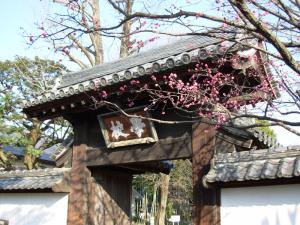
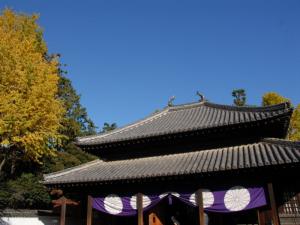
| Address | 2338 Shohei-cho Ashikaga City |
|---|---|
| Phones | 0284-41-2655 |
| Open Hours | From 9時00分am - 4時30分pm(April-September) From 9時00分am - 4時00分pm(October-March) |
| Closed | The 3rd Monday(except holidays) The New Year holiday season |
| Admission Fees | Adult 400 yen /High School Student 210 yen Jr high and under : free |
| Parking Lot | Kanko Parking lot (Taiheikikan) |
Bannaji Temple

Bannaji Temple was founded by Yoshikane Ashikaga, a member of the second generation of Ashikaga family. He held a ceremony in his garden in 1196 A.D. for "Dainichi Nyorai" who was their patron saint.The third man in Ashikaga line, Yoshiuji, built the main temple, and other buildings.There is moat and dike around temple, and the area is about 9.9A.Bannaji Temple has maintained the style of the Kamakura era (1192-1333) and was designated a National Historic Site in 1922.With it's beautiful cherry blossoms in Spring , and yellow ginko tree in Autumn, the citizens of Ashikaga lovingly call the temple, "Dainichisama".
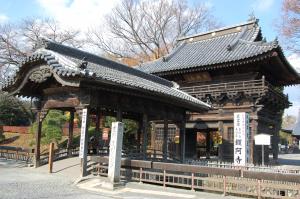
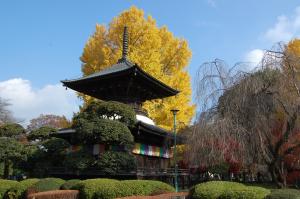
| Address | 2220 Ietomi-cho Ashikaga City |
|---|---|
| Phone | 0284-41-2627 |
| Open Hours | From 10時00分am - 6時00分pm (enter by 5時30分pm) |
| Admission Fees | Free |
| Access | 0.4 mil. from JR Ashikaga Station 0.6 mil. from Tobu Ashikaga-shi Station |
| Parking Lot | Kanko parking lot (Taiheikikan) |
Ashikaga Flower Park
Ashikaga Flower Park is well known for the big 130 year wisteria, the wisteria trellis covering about the area of 500 tatami mats and white wiateria tunnel running the length of 80 meters.
Besides these, you can enjoy Kurume azeleas that are over 60 years old. There are also hydrangeas and a heavy growth of irises.
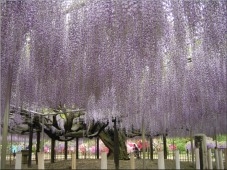
To Ashikaga Flower Park Homepage(Japanese)
| Address | 607 Hasama cho Ashikaga City |
|---|---|
| Phone | 0284-91-4939 |
| Open Hours | From 9時00分am -18時00分pm *Closing time changes by the season. |
| Admission Fee | changes by the season |
| Access | 0.9 mil. from JR Tomita Station 4.0 mil. from Tobu Ashikaga-shi Station |
| Parking Lot | Free parking 40 buses and 300 cars |
Kurita Museum
Kurita Museum has a fine collection of both "Imari" and "Nabeshima" porcelains. They were the first kinds of pottery made by the Nabeshima clan in Japan during the "Edo period"(1603-1867). This museum is the largest porcelain museum in the world.
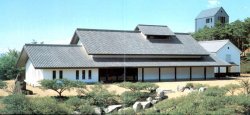
To Kurita Museum's Homepage (Japanese)
| Address | 1542 Komaba-cho Ashikaga City |
|---|---|
| Phone | 0284-91-1026 |
| Open Hours | From 9時30分am - 5時00分pm |
| Closed | Monday(except holidays) Dec.28- Jan.2 |
| Admission Fees | Adult 1,550 yen /Student 520 yen The group more than 20 members 10% discount |
| Access | 10 min. from JR Tomita Station |
| Parking Lot | Free parking 10 buses and 350 cars |
City Museum of Art
There is a City Art Museum on Shinai-tori 2 Chome Nakabashi-dori.
The museum collects works by artists in connection with the Ashikaga Bunkaken(Cultural Zone)and has a permanent exhibition.Planned exhibitions introduce the wide variety of art,the works by international and local artists,from different points of view.The museum gives lectures according to the themes of exhibitions and lots of citizens get interested in them.
It possesses many works by KAWASHIMA Riichiro and OYAMA Rogyu from Ashikaga city.
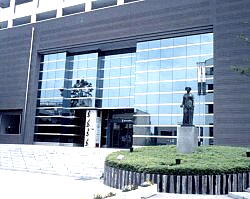
To City Museum's Homepage (Japanese)
| Address | 2-14-7 Tori Ashikaga City |
|---|---|
| Phone | 0284-43-3131 |
| Open Hours | From 10時00分am - 6時00分pm (enter by 5時30分pm) |
| Closed | Monday (except holidays) |
| Admission Fees | changes by the exihibition |
| Access | 7min. from JR Ashikaga Station 7min. from Tobu Ashikaga-shi Station |
| Parking Lot | Bijutsu-kan Hiroba parking lot / free Ibuki parking lot / free |
Orihime Shrine
"When you come to Ashikaga, put a mark on the vermilion Orihime Shrine, ♪Karariko-ton-ton,♪Karariko-ton, Ashikaga is as beautiful a city as a picture, a textile city."
The Orihime Shrine appeared in the Ashikaga Ondo(chorus) like this. Here, the guardians of the textile city, Ashikaga, famous for its 1,300 year old history and tradition, are buried.
This shrine was built in 1879, but the next year it was destroyed by fire. In 1934, this shrine began to be re-built using reinforced-concrete, which was rare at the time. It took 3 years to complete and in 1937, the present shrine was completed.
The vermilion lacquered shrine is beautiful with its green color and has good scenery. This area is also the departure and arrival point for the Ashikaga Prefectural Nature Preserve hiking course.
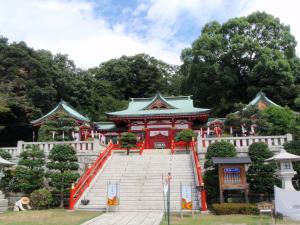
| Address | 3889 Noshinomiya cho Ashikaga City |
|---|---|
| Phone | 0284-22-0313 |
| Access | 1.4 mil. from JR Ashikaga Station 1.4 mil. from Tobu Ashikaga-shi Station |
| Parking Lot |
2 places in Orihime park for 50 cars / free |
Soun Museum
Soun Museum was built to collect, preserve and show the public Soun Tazaki's(1815~1898) posthumously collected works and articles and Hakuseki Sanbo, which is famous for its connection with Soun.
Soun took an active part in various areas. From childhood, he studied painting under Ujyu Kanai(Buncho Tani's disciple).
Hakuseki Sanbo is the house where he used to live in and Soun painted the greater part of his works here until 1898, when he passed away at 84years old.
His main works are :
- Kenpon Chakushoku: Hourai Senkyuzu (The painting of a Chinese legendary unworldly scenery)
- Kenpon Bokuga: Fugakuzu(The painting of Mt. Fuji)
- Syutou Houbinzu(The painting of autumn and winter flowers arranged in a vase)
- Gika Inkozu(The painting of a parakeet)
- Syunka Kourozu(The painting of spring and summer flowers arranged in a basket)
His works were also evaluated highly in foreign countries and exhibited in expositions in Paris and Chicago.
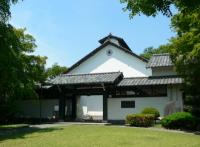
To Soun Museum's Homepage (Japanese)
| Address | 2-3768 Midori cho Ashikaga City |
|---|---|
| Phone | 0284-21-3808 |
| Open Hours | From 9時00分am - 4時00分pm |
| Closed | Monday, the after a notional holidays the new year holiday period |
| Admission Fee | Adult and High School Student : 210yen Jr. High and younger : free |
| Parking Lot | Free parking for 10 cars |
Ashikaga Fireworks Festival
The Fireworks Display has been held since 1903. The history and scale of this display is said to be the largest in the northern Kanto district. From 12,000 to 15,000 fireworks, such as Shakudama(12 inches across shell), skyrockets and Star-mine are used to provide a dazzling combination of sound and light for the viewers to enjoy. Attractive points are the final fireworks(called Niagara) which are set off in two rows, each 1967ft. long. The week in which the Ashikaga Firework takes place is called "Watarase Summer Festa". A jazz concert and other events are held at Event Hiroba near the Watarase River Naka Bridge.
